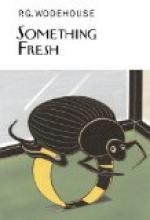On the theory, given to the world by William Shakespeare, that it is the lean and hungry-looking men who are dangerous, and that the “fat, sleek-headed men, and such as sleep o’ nights,” are harmless, R. Jones should have been above suspicion. He was infinitely the fattest man in the west-central postal district of London. He was a round ball of a man, who wheezed when he walked upstairs, which was seldom, and shook like jelly if some tactless friend, wishing to attract his attention, tapped him unexpectedly on the shoulder. But this occurred still less frequently than his walking upstairs; for in R. Jones’ circle it was recognized that nothing is a greater breach of etiquette and worse form than to tap people unexpectedly on the shoulder. That, it was felt, should be left to those who are paid by the government to do it.
R. Jones was about fifty years old, gray-haired, of a mauve complexion, jovial among his friends, and perhaps even more jovial with chance acquaintances. It was estimated by envious intimates that his joviality with chance acquaintances, specially with young men of the upper classes, with large purses and small foreheads—was worth hundreds of pounds a year to him. There was something about his comfortable appearance and his jolly manner that irresistibly attracted a certain type of young man. It was his good fortune that this type of young man should be the type financially most worth attracting.
Freddie Threepwood had fallen under his spell during his short but crowded life in London. They had met for the first time at the Derby; and ever since then R. Jones had held in Freddie’s estimation that position of guide, philosopher and friend which he held in the estimation of so many young men of Freddie’s stamp.
That was why, at twelve o’clock punctually on this Spring day, he tapped with his cane on R. Jones’ ground glass, and showed such satisfaction and relief when the door was opened by the proprietor in person.
“Well, well, well!” said R. Jones rollickingly. “Whom have we here? The dashing bridegroom-to-be, and no other!”
R. Jones, like Lord Emsworth, was delighted that Freddie was about to marry a nice girl with plenty of money. The sudden turning off of the tap from which Freddie’s allowance had flowed had hit him hard. He had other sources of income, of course; but few so easy and unfailing as Freddie had been in the days of his prosperity.
“The prodigal son, by George! Creeping back into the fold after all this weary time! It seems years since I saw you, Freddie. The old gov’nor put his foot down—didn’t he?—and stopped the funds. Damned shame! I take it that things have loosened up a bit since the engagement was announced—eh?”
Freddie sat down and chewed the knob of his cane unhappily.
“Well, as a matter of fact, Dickie, old top,” he said, “not so that you could notice it, don’t you know! Things are still pretty much the same. I managed to get away from Blandings for a night, because the gov’nor had to come to London; but I’ve got to go back with him on the three-o’clock train. And, as for money, I can’t get a quid out of him. As a matter of fact, I’m in the deuce of a hole; and that’s why I’ve come to you.”




